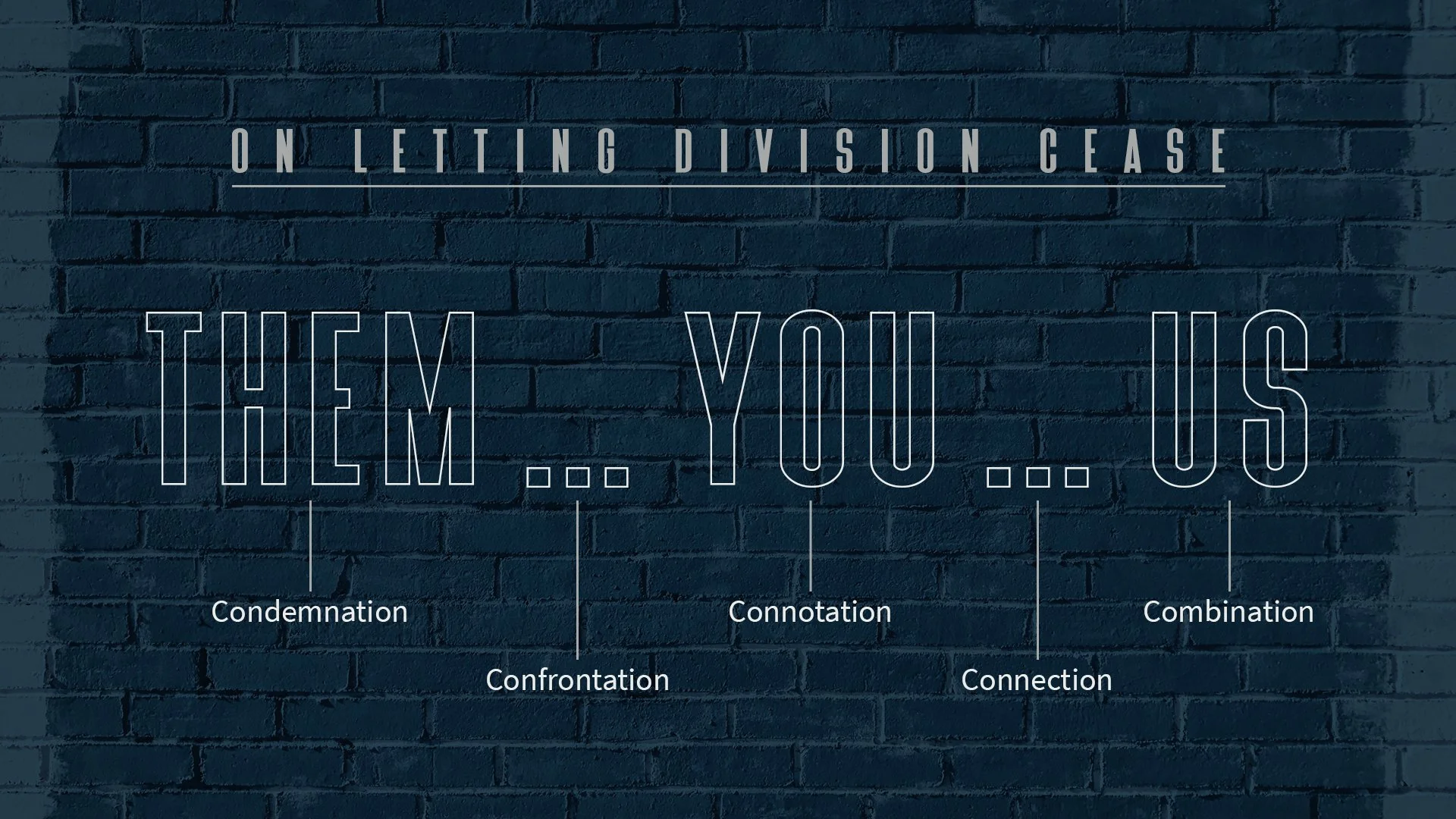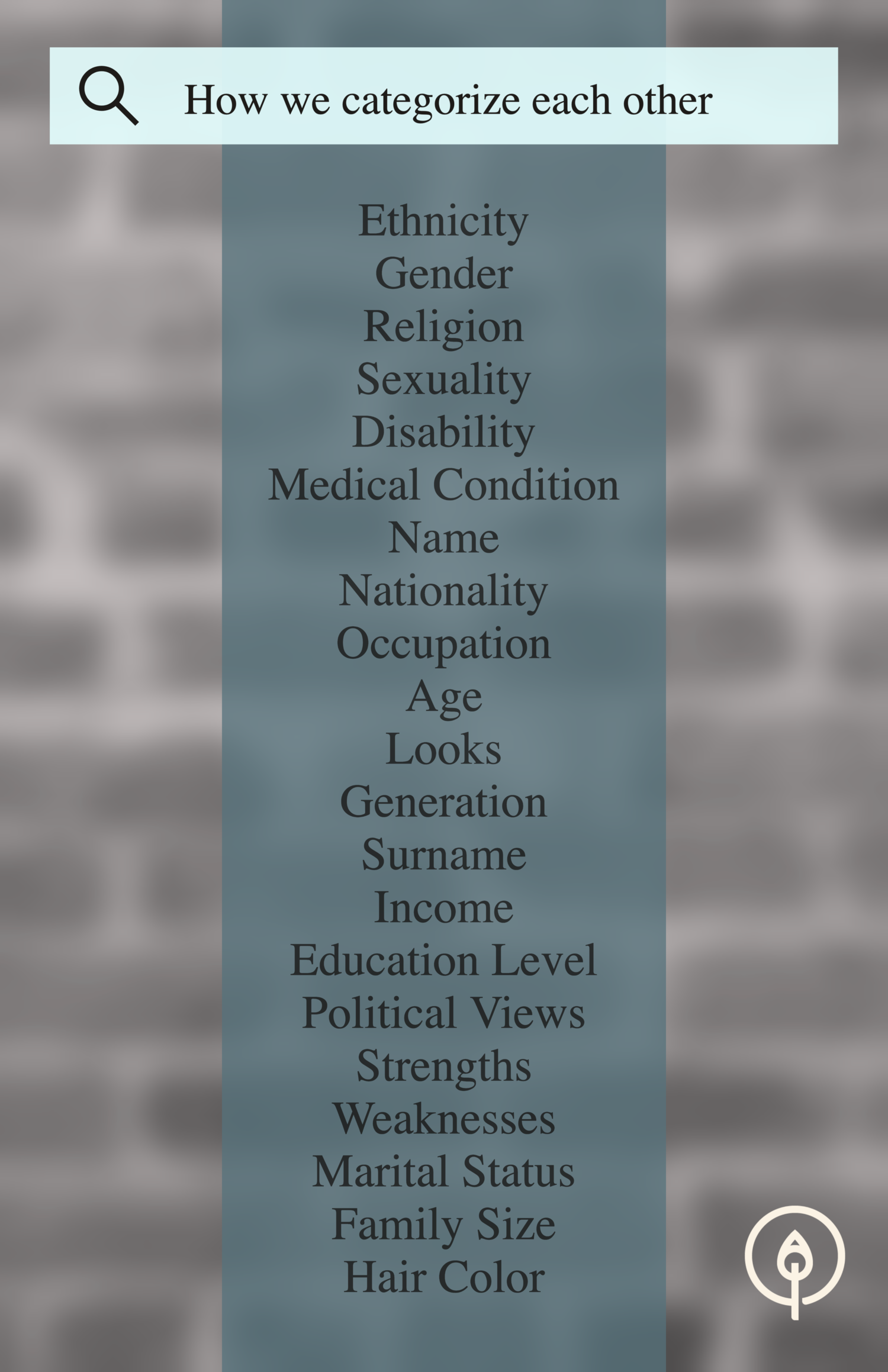First, let’s define connotation.
Connotation comes from two Latin words: “con” means “with,”
and “notation” means, well, notation.
Therefore, to have a connotation toward something means to look at it not simply as it is, but with some kind of notes. These notes might come from previous experience, prior knowledge, or hearsay - but they consist of things you believe apply to whatever is at hand.
If it helps, connotation is the opposite of denotation—while denotation is all about explicit meaning (a dozen roses is just a group of flowers) connotation is all about implicit meaning (a dozen roses means you’re sorry… or happy… or in love.)
The human mind uses connotations to take short-cuts toward understanding.
(This has pros and cons…)
Watch this video of a connotation-related study by Harvard.
Think about your ‘notes.’
You have ‘notes’ that could be added to yourself. Think, for example, of all the ways various entities in the world categorize you.
(I’m sure you can think of others, too. It’s frankly exhausting. I’m sorry you are commoditized in so many ways, you complex and wonderful and fearfully-made being.)
Of course, it’s not just random entities “out there” that categorize you.
Everyone has ‘notes’ about themselves, including lists of…
regrets
failures
fears
missed opportunities
hidden truths
bad habits
broken promises
unmet goals
cynicisms
and more…
The great thing about God? He doesn't need notes—so he does whatever he wants with them.
Choose a verse as a reminder this week.
God doesn’t consider your connotations. God sees you as pure, and with room for new notes. Out with the old (whether seemingly good or bad), and in with the new—starting with Jesus Christ.
(Watch how much focus is put on Jesus in this section of the Bible that talks about our “old notes” vs our “new notes.”)
But whatever were gains to me I now consider loss for the sake of Christ. What is more, I consider everything a loss because of the surpassing worth of knowing Christ Jesus my Lord, for whose sake I have lost all things. I consider them garbage, that I may gain Christ and be found in him, not having a righteousness of my own that comes from the law, but that which is through faith in Christ—the righteousness that comes from God on the basis of faith. I want to know Christ—yes, to know the power of his resurrection and participation in his sufferings, becoming like him in his death, and so, somehow, attaining to the resurrection from the dead.
Philippians 3:7-11
These verses say that the old notes are garbage, so treat them as such. Get rid of them—God already has.
Instead, take one of these verses, write it on a piece of paper, on your desktop, or in an app, and put it somewhere you’ll see it this week.
2 Corinthians 5:17 | Therefore, if anyone is in Christ, the new creation has come: The old has gone, the new is here!
Psalm 25:7 | Do not remember the sins of my youth and my rebellious ways; according to your love remember me, for you, Lord, are good.
1 Peter 1:23 | For you have been born again, not of perishable seed, but of imperishable, through the living and enduring word of God.
Listen to this song about how God sees you and your connotations.
Consider the many faces of connotation.
Micah 6:8 | He has shown you, O mortal, what is good. And what does the Lord require of you? To act justly and to love mercy and to walk humbly with your God.
Getting control over your connotations requires identifying and understanding them. The more you understand the connotations through which you perceive someone, the more you’ll be ready to “act justly and to love mercy.”
(The complicated part is that there are as many versions of connotation as there are people.)
To practice identifying different ways connotation becomes part of human thinking, here’s a game of Connotations Jeopardy.
(Begin by selecting “When They Don’t Know You” for 100. Whoever in your group states the correct answer first gets to choose the next answer.)
Word Bank:
Assumption | Insensitivity | Bigotry | Tolerance | Prediction | Injustice | Discrimination | Prejudice | Unfairness | Reputation | Intolerance | Partiality | Favoritism | Ignorance | Rejection | Predilection
As you can see, there are many versions of connotation—some positive, some neutral, some negative. Which of these do you tend to bring into your interactions with others?
Let’s play another game—another game of Jeopardy—but different.
This round is designed to impress two things on you:
God is impartial.
You are called to be impartial.
You’ll be given a Bible verse with a blank. Each time the question will be “What is (the word that should be in the blank)?”
(Bonus points if you can give/guess the book, chapter, and verse. Also, no word bank this time! Simply call out the question if you know it, and whoever gets it right gets to pick the next answer.)
Thanks for playing. Here’s the point:
Connotation comes in many forms.
God is impartial.
You are called toward impartiality, too—which means learning to identify your connotations.
As you think back over this learn section, discuss the following questions:
What versions of connotation did you identify in yourself that you hadn’t spent much time considering before?
What does it mean to you that God is truly impartial?
How does the fact that God approaches you without notes (as we talked about in the Worship section) affect your ability to do the same for others?
What do we do about divisive people?
Though God repeatedly urges his people toward unity, the reality of sin means that while you may strive for it, some will strive against it.
God’s not surprised by this, and he spoke to it in the Bible. Watch the video below to think further on what to do when you cross paths with someone intent on dividing.
Titus 3:10-11 | Warn a divisive person once, and then warn them a second time. After that, have nothing to do with them. You may be sure that such people are warped and sinful; they are self-condemned.
Romans 16:17-19 | I urge you, brothers and sisters, to watch out for those who cause divisions and put obstacles in your way that are contrary to the teaching you have learned. Keep away from them. For such people are not serving our Lord Christ, but their own appetites. By smooth talk and flattery they deceive the minds of naive people. Everyone has heard about your obedience, so I rejoice because of you; but I want you to be wise about what is good, and innocent about what is evil.
Let’s talk about (and do something with) radical listening.
In last week’s Spotlight, “Confrontation,” the idea of radical listening was introduced.
To review, take a look at this PDF summary of radical listening from the communication experts at Connected Realities.
This week’s serve opportunity is an exercise in radical listening in a completely safe environment. The task is simple: this week find and listen to at least 3 minutes of content with which you disagree. This might mean switching radio stations, watching a politician speak on YouTube, or finding the testimonial page on the website of an organization you don’t support. As you listen, apply the principles of radical listening.
If you already have an idea where you’ll turn to complete this, please share it with your group. You might help someone else find the resource they’re looking for, too.
Pray, using the prompts in this video.
Listen and meditate with this song.
Close out your time today with the song Instruments of Peace.
Lyrics
As long as we cling to the object of fame
There will always be louder voices calling our name
Than the one we gave our lives to a long time ago
Saying, “love the Lord your God with all your soul.”
As long as we’re making our idols of men
There will always be a point of view we have to defend
Than the one we gave our lives to a long time ago
Saying, “love your neighbor’s life as your own.”
I’m not giving up on this fight
I know there’s still good to come
Our battle is with the darkness
Not flesh and blood
As long as we’re pledging allegiance to this nation
There will always be a reason justifying our hatred
With building up the walls instead of tearing them down
No this ain’t what the Kingdom is about
I’m not giving up on this fight
I know there’s still good to come
Our battle is with the darkness
Not flesh and blood
So let us be mindful of all that we’re saying
There’s room for every one of us and love is the way in
Jesus is the life and light for all humanity
And we are his instruments of peace
May the grace of the Lord Jesus Christ,
and the love of God,
and the fellowship of the Holy Spirit be with us all.
(2 Corinthians 13:14)





